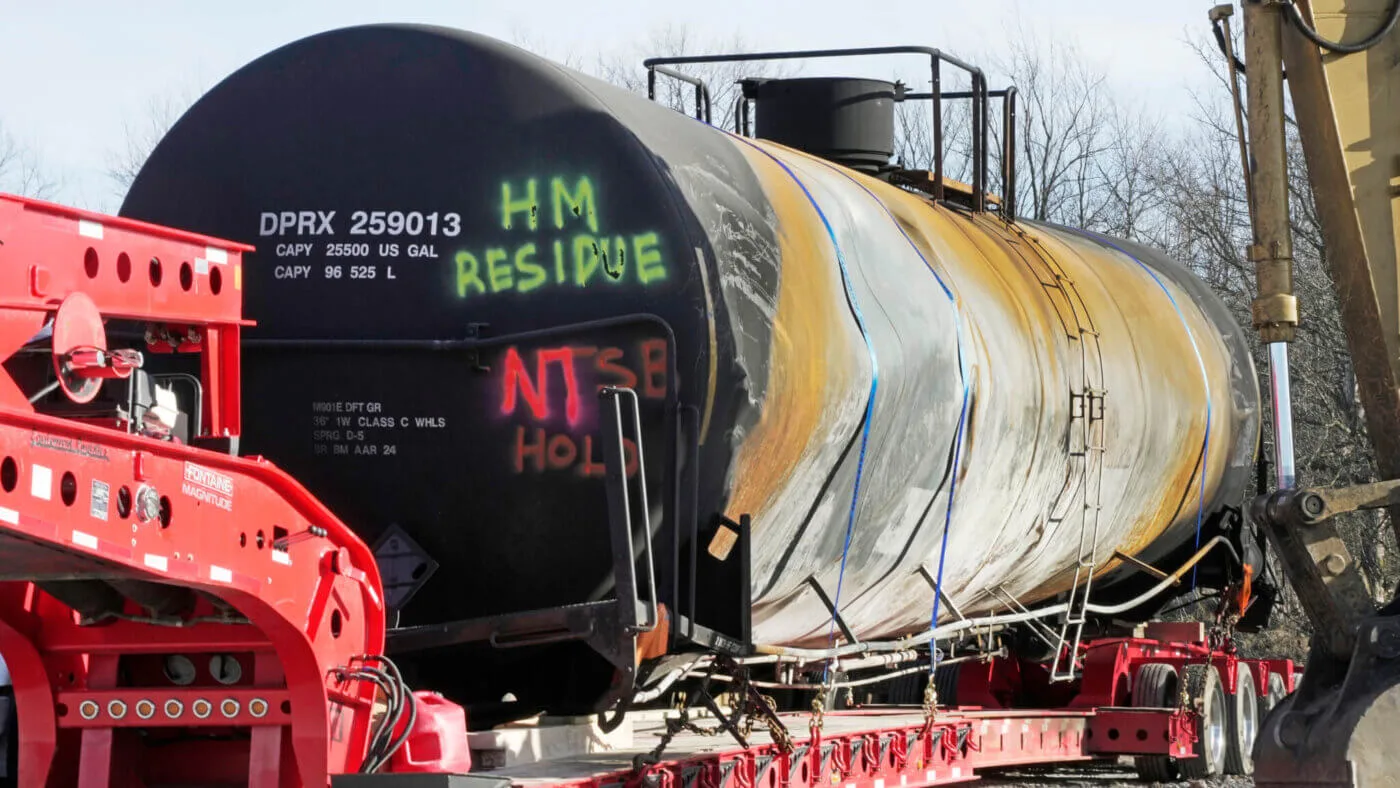
A tank car sits on a trailer as the cleanup of portions of a Norfolk Southern freight train that derailed over a week ago continues in East Palestine, Ohio, Wednesday, Feb. 15, 2023. (AP Photo/Gene J. Puskar)
It’s been two weeks since a fiery train derailment and subsequent burning of hazardous chemicals happened in East Palestine, Ohio, just a quarter-mile from Beaver County.
As the head of the US Environmental Protection Agency got a first-hand look Thursday at the toll left by a freight train derailment in Ohio, where toxic chemicals spilled or were burned off, officials just across the state line in Beaver County assured residents they weren’t at risk, despite their close proximity to the accident, and were monitoring the situation closely.
“We want to emphasize to the citizens of Beaver County, there has been nothing to date to indicate air, water, or soil in Beaver County has been compromised as a result of this train derailment,” the Beaver County Board of Commissioners said in a statement. “Be assured that State and Federal Agencies will continue to monitor the scene and will let us know if that were to change.”
The commissioners said they received assurances from the Pennsylvania Department of Environmental Protection and the Pennsylvania Emergency Management Agency that local air monitor readings have been at safe levels since the Feb. 3 derailment and the state will continue to run tests on the water in the area and provide details as they become available.
The fiery train derailment and subsequent burning of hazardous chemicals happened in East Palestine, Ohio, just a quarter-mile from Beaver County. Earlier in the week, Gov. Josh Shapiro placed the blame on railway company Norfolk Southern as residents on both sides of the state line worried about potential air and water contamination.
In a letter to Norfolk CEO Alan Shaw, Shapiro said he has serious concerns about the way the train company handled the 50-car derailment. While no one was injured in the wreck — which happened because of a mechanical issue with a rail car axle — the surrounding area had to be evacuated due to fears of a potential explosion from the hazardous chemicals on board the train. Beaver County was among the areas evacuated.
Officials seeking to avoid the danger of an uncontrolled blast chose to intentionally release and burn toxic vinyl chloride from five rail cars, sending flames and black smoke again billowing high into the sky. The jarring scene left people questioning the potential health impacts for residents in the area and beyond, even as authorities maintained they were doing their best to protect people.
Shapiro accused Norfolk of mismanaging the disaster from the outset, citing the company’s failure to immediately notify the Pennsylvania Department of Environmental Protection and the Pennsylvania Emergency Management Agency. Norfolk’s actions, he said, hampered the response from local and state agencies, and put residents and first responders at serious risk. Shapiro also said the company had been unwilling to look at alternatives to intentionally releasing and burning the five cars filled with vinyl chloride.
“While I appreciate that responding to train derailments presents an array of complex challenges, failure to adhere to well-accepted standards related to practice of incident management and prioritizing an accelerated and arbitrary timeline to reopen the rail line injected unnecessary risk and created confusion in the process,” Shapiro said. “You can be assured that Pennsylvania will hold Norfolk Southern accountable for any and all impacts to our commonwealth.”
On Thursday, EPA Administrator Michael Regan walked along an East Palestine creek that still reeks of chemicals, and sought to reassure skeptical residents that the water is fit for drinking and the air safe to breathe around the town where just under 5,000 people live.
“I’m asking they trust the government. I know that’s hard. We know there’s a lack of trust,” Regan said. “We’re testing for everything that was on that train.”
Since the derailment, residents have complained about headaches and irritated eyes and finding their cars and lawns covered in soot. The hazardous chemicals that spilled from the train killed thousands of fish, and residents have talked about finding dying or sick pets and wildlife.
Residents are frustrated by what they say is incomplete and vague information about the lasting effects from the disaster, which prompted evacuations.
“I have three grandbabies,” said Kathy Dyke, who came with hundreds of her neighbors to a public meeting Wednesday where representatives of railroad operator Norfolk Southern were conspicuously absent. “Are they going to grow up here in five years and have cancer?”
Regan said Thursday that anyone who is fearful of being in their home should seek testing from the government.
“People have been unnerved. They’ve been asked to leave their homes,” he said, adding that if he lived there, he would be willing to move his family back into the area as long as the testing shows it’s safe.
At least five lawsuits have been filed against the railroad, which announced this week that it is creating a $1 million fund to help the community while continuing to remove spilled contaminants from the ground and streams and monitoring air quality.
There have been anecdotal reports that pets or livestock have been sickened. No related animal deaths have been confirmed and the risk to livestock is low, Ohio officials said, but the state Agriculture Department is testing samples from a beef calf that died a week after the derailment.
Information from the Associated Press was used in this report.
Support Our Cause
Thank you for taking the time to read our work. Before you go, we hope you'll consider supporting our values-driven journalism, which has always strived to make clear what's really at stake for Pennsylvanians and our future.
Since day one, our goal here at The Keystone has always been to empower people across the commonwealth with fact-based news and information. We believe that when people are armed with knowledge about what's happening in their local, state, and federal governments—including who is working on their behalf and who is actively trying to block efforts aimed at improving the daily lives of Pennsylvania families—they will be inspired to become civically engaged.


For Rep. Susan Wild, supporting PA families includes reproductive rights and much more
Rep. Susan Wild wants to be very clear with Pennsylvanians: Donald Trump is committed to taking away women’s reproductive freedom, but he is not...

School districts working with anti-LGBTQ groups can cost your kids’ schools millions
Parents across South Central Pennsylvania are worried about the potential financial impacts working with anti-LGBTQ groups may have on their school...

VIDEO: Trump distances himself from his anti-abortion views
Donald Trump appeared on WGAL on Tuesday and continued to distance himself from his anti-abortion views claiming that reproductive rights are now a...

VIDEO: Community pushback gets school board to rescind decision on denying gay actor’s visit
Cumberland Valley School Board offered a public apology and voted to reinstate Maulik Pancholy as a guest speaker a week after the board voted to...

VIDEO: Project 2025 brings nuclear armageddon back into vogue
Project 2025 is a titanic document, with plans ranging from cutting half of all government employees to targeting reproductive rights on a scale...




